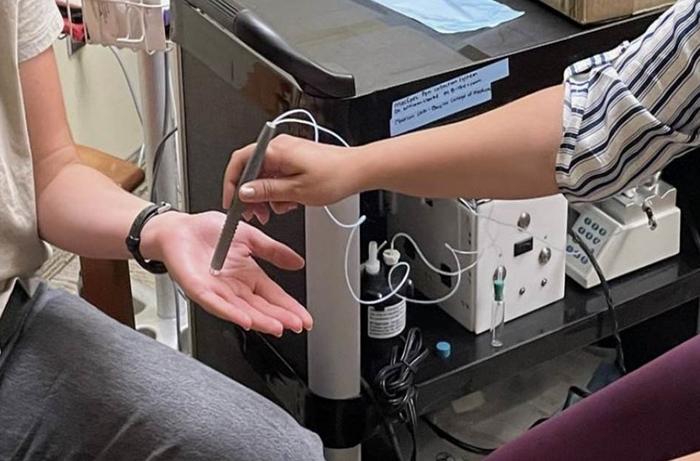
In the relentless battle against the opioid crisis, innovative detection methods play a pivotal role in saving lives and enabling timely interventions. Recently, scientists have developed a groundbreaking handheld device known as the Modular MasSpec Pen, designed to revolutionize opioid screening by sampling molecules non-invasively from the skin’s surface. This novel technology offers a faster, simpler, and less intrusive alternative to conventional methods that require bodily fluids, standing as a beacon of hope in clinical toxicology and emergency medicine.
Opioids such as fentanyl, morphine, and oxycodone constitute the most prevalent agents linked to overdose deaths in the United States. Traditionally, screening for these potent drugs involves the collection and laboratory analysis of blood, saliva, or urine samples, procedures that are logistically challenging and often time-consuming. Against this backdrop, the Modular MasSpec Pen emerges as a formidable tool that circumvents these challenges by directly extracting trace molecules excreted onto the skin, thereby enabling rapid detection of opioid exposure.
The science behind the Modular MasSpec Pen leverages mass spectrometry, a sophisticated analytical technique that identifies molecules based on their mass-to-charge ratio. What sets this device apart is its ingenious design combining a miniature solvent delivery system with precise molecular extraction capabilities in a pen-like format. When applied to the skin, the device emits a controlled mixture of water and ethanol onto a localized area, facilitating the solubilization of molecular residues.
.adsslot_269lXDU0vI{width:728px !important;height:90px !important;}
@media(max-width:1199px){ .adsslot_269lXDU0vI{width:468px !important;height:60px !important;}
}
@media(max-width:767px){ .adsslot_269lXDU0vI{width:320px !important;height:50px !important;}
}
ADVERTISEMENT
Within three seconds, the solvent droplet absorbs the molecular fingerprint of compounds deposited on the skin, including opioids or their metabolites. Subsequently, this droplet is retracted into the pen, where it’s either immediately analyzed or preserved for subsequent laboratory assessment. Utilizing electrospray ionization mass spectrometry (ESI-MS), researchers can detect minute quantities of target molecules with high sensitivity, despite the complexity of the skin’s biochemical environment.
This approach represents a radical departure from conventional sample collection, which typically involves invasive methods or the handling of biofluids prone to degradation and contamination. The MasSpec Pen’s non-destructive, painless interaction with the skin opens the door to point-of-care applications, where rapid screening could inform immediate clinical decisions. Such agility is especially critical in overdose situations or in outpatient settings where swift diagnoses are paramount.
The development team, comprising experts including Dr. Livia Eberlin and William Clarke from Johns Hopkins University, rigorously tested the pen on human participants known to have consumed opioids like fentanyl and hydromorphone. They conducted comparative analyses between samples collected by the MasSpec Pen and standard saliva and urine tests. Remarkably, the pen detected fentanyl in seven out of eight skin samples, although hydromorphone was not consistently identified—an outcome attributed to pharmacokinetics and timing of drug metabolism.
Urine samples predictably exhibited the highest detection rates for both fentanyl and hydromorphone, reflecting their established role in toxicological screening. Saliva testing yielded mixed results, detecting fentanyl in five samples and hydromorphone in four, but one saliva sample could not be tested due to technical issues. Despite the lower detection frequency in skin-based samples, the MasSpec Pen demonstrates immense potential due to its ease of use, portability, and ability to offer near-real-time biochemical insights.
Several factors influence the detection sensitivity of the MasSpec Pen, including skin type, hygiene, and the cumulative extent of opioid exposure. The researchers emphasize the need for further studies to elucidate these variables and optimize sampling protocols. Moreover, understanding the temporal dynamics of drug excretion onto the skin could refine the interpretive frameworks for results obtained by this technology.
Under the hood, the MasSpec Pen’s success owes much to its modular design which allows easy adaptation for different analytical scenarios. The device integrates seamlessly with electrospray ionization mass spectrometers, enabling the analysis of complex molecular mixtures without extensive sample preparation. This capability also underscores the potential for expanding its utility beyond opioids to a broader spectrum of drugs or biomarkers relevant to clinical diagnostics.
The implementation of the MasSpec Pen could drastically reduce the logistical burdens in emergency and clinical toxicology settings. By eliminating the dependency on biofluids, the device minimizes biohazard risks and the need for specialized collection personnel, thereby streamlining workflows and enhancing patient comfort. Such advantages could facilitate widespread adoption in diverse environments, from hospital emergency rooms to community health clinics and even field settings.
Financial and ethical considerations underpin the research, with funding from the Eli Lilly Young Investigator Award, a Welch Research Grant, and Thermo Fisher Scientific supporting the project. Institutional review board approvals ensured ethical compliance in the collection and analysis of human skin samples, reinforcing the rigor and responsibility embedded in this research endeavor.
Importantly, some of the investigators hold patents related to the MasSpec Pen and are involved in commercializing the technology through MS Pen Technologies, Inc., signifying the translational momentum behind this innovation. As the opioid epidemic remains a pressing public health challenge, advances like the Modular MasSpec Pen exemplify how cutting-edge chemistry and engineering converge to empower medical science.
In conclusion, the Modular MasSpec Pen heralds a new era in opioid screening by offering rapid, non-invasive detection through skin analysis, paving the way for enhanced clinical interventions and improved outcomes for individuals at risk of overdose. Continued refinement and validation of this technology promise to elevate toxicology diagnostics and contribute meaningfully to public health initiatives combating substance abuse.
Subject of Research: Clinical opioid screening using non-invasive molecular sampling from skin.
Article Title: “Development and Application of the Modular MasSpec Pen System for Clinical Opioid Screening”
News Publication Date: 21-May-2025
Web References:
http://dx.doi.org/10.1021/acs.analchem.5c00558
Image Credits: William Clarke, Johns Hopkins University School of Medicine
Keywords
Chemistry, Health and medicine, Drug abuse, Opioids
Tags: clinical applications of MasSpec Penemergency medicine advancementsfentanyl and overdose preventionhandheld opioid detection deviceinnovative opioid screening techniquesmass spectrometry in toxicologyModular MasSpec Pennon-invasive drug screening methodsopioid crisis interventionrapid opioid detection technologyskin analysis for opioidstrace molecule extraction technology





